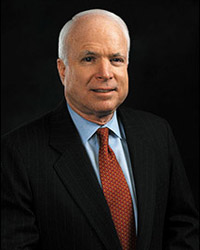McCain calls for a conservative ethic in water management

Presidential hopefuls lay out plan for scientific policy
by C.T. Pope
Circle of Blue
Republican hopeful, John McCain outlined his views towards science and technology with his response to a 14-question survey produced by Science Debate 2008 and Scientists & Engineers for America (SEA) on Monday. Outlining his policies in topics ranging from space exportation to water management, McCain painted a picture of increased incentives for research via tax relief and spending reform. “Nurturing technology and innovation is essential for solving the critical problems facing our country,” he said.
As former chairman of the Senate Committee on Commerce, Science and Transportation, McCain noted his past experience in scientific policy development and highlighted the importance of scientific research in developing alternative fuels, addressing climate change, alleviating health care expenses, and better educating our children.
On water, McCain emphasized better management. “I believe that we must develop, manage, and use our limited water supplies wisely and with a conservation ethic to ensure that we have sufficient supplies to meet municipal, tribal, industrial, agricultural, recreational, and environmental needs,” he said.
In addition McCain highlighted the importance of respecting water rights and resolving water disputes through negotiations. “[D]isputes are better resolved not in the courts but through negotiations that build consensus, and provide justly for the needs of the west’s diverse interests and needs,” he explained.
As part of Circle of Blue’s partnership with Scientists and Engineer’s for America, Circle of Blue previously reported on Barack Obama’s response to the questionnaire.
Both McCain and Obama’s complete answers to the water policy question follow. Find a complete comparison of the candidates’ views on all fourteen issues here.
 |
 |
 |
ON WATER |
| Thirty-nine states expect some level of water shortage over the next decade, and scientific studies suggest that a majority of our water resources are at risk. What policies would you support to meet demand for water resources? | |
 |
|
| McCain: As a westerner, I understand the vital role that water plays in the development of western economies and to maintaining a high quality of life. Water is truly our lifeblood. I believe that we must develop, manage, and use our limited water supplies wisely and with a conservation ethic to ensure that we have sufficient supplies to meet municipal, tribal, industrial, agricultural, recreational, and environmental needs. I believe that water rights must be respected, and that disputes are better resolved not in the courts but through negotiations that build consensus, and provide justly for the needs of the west’s diverse interests and needs. I understand the importance of state law and local prerogatives in the allocation of water resources, and that all levels of government must work together with stakeholders to ensure that our lifeblood is protected, managed, and utilized in a wise, just, and sustainable manner. I support constructive, continuing cooperation and dialogue among the states and the water users in a manner that is fully consistent with existing compacts and agreements. This is an approach that is forward looking, and ensures cooperation in achieving implementation of water agreements among the states and the Department of the Interior and is mindful of potential technological developments that could potentially reduce water demands in certain areas. |
Obama: Solutions to this critical problem will require close collaboration between federal, state, and local governments and the people and businesses affected. First, prices and policies must be set in a ways that give everyone a clear incentive to use water efficiently and avoid waste. Regulations affecting water use in appliances and incentives to shift from irrigated lawns to “water smart” landscapes are examples. Second, information, training, and, in some cases, economic assistance should be provided to farms and businesses that will need to shift to more efficient water practices. Many communities are offering kits to help businesses and homeowners audit their water use and find ways to reduce use. These should be evaluated, with the most successful programs expanded to other states and regions. I will establish a national plan to help high-growth regions with the challenges of managing their water supplies. In addition, it is also critical that we undertake a concerted program of research, development, and testing of new technologies that can reduce water use. |
C. T. Pope is a Circle of Blue staff writer and researcher. Reach him at circleofblue.org/contact. Inset top image from McCain-Palin 2008, portraits of the representatives courtesy of United States Federal Government (public domain).
Circle of Blue’s east coast correspondent based in New York. He specializes on water conflict and the water-food-energy nexus. He previously worked as a political risk analyst covering equatorial Africa’s energy sector, and sustainable development in sub-Saharan Africa. Contact: Cody.Pope@circleofblue.org








Leave a Reply
Want to join the discussion?Feel free to contribute!